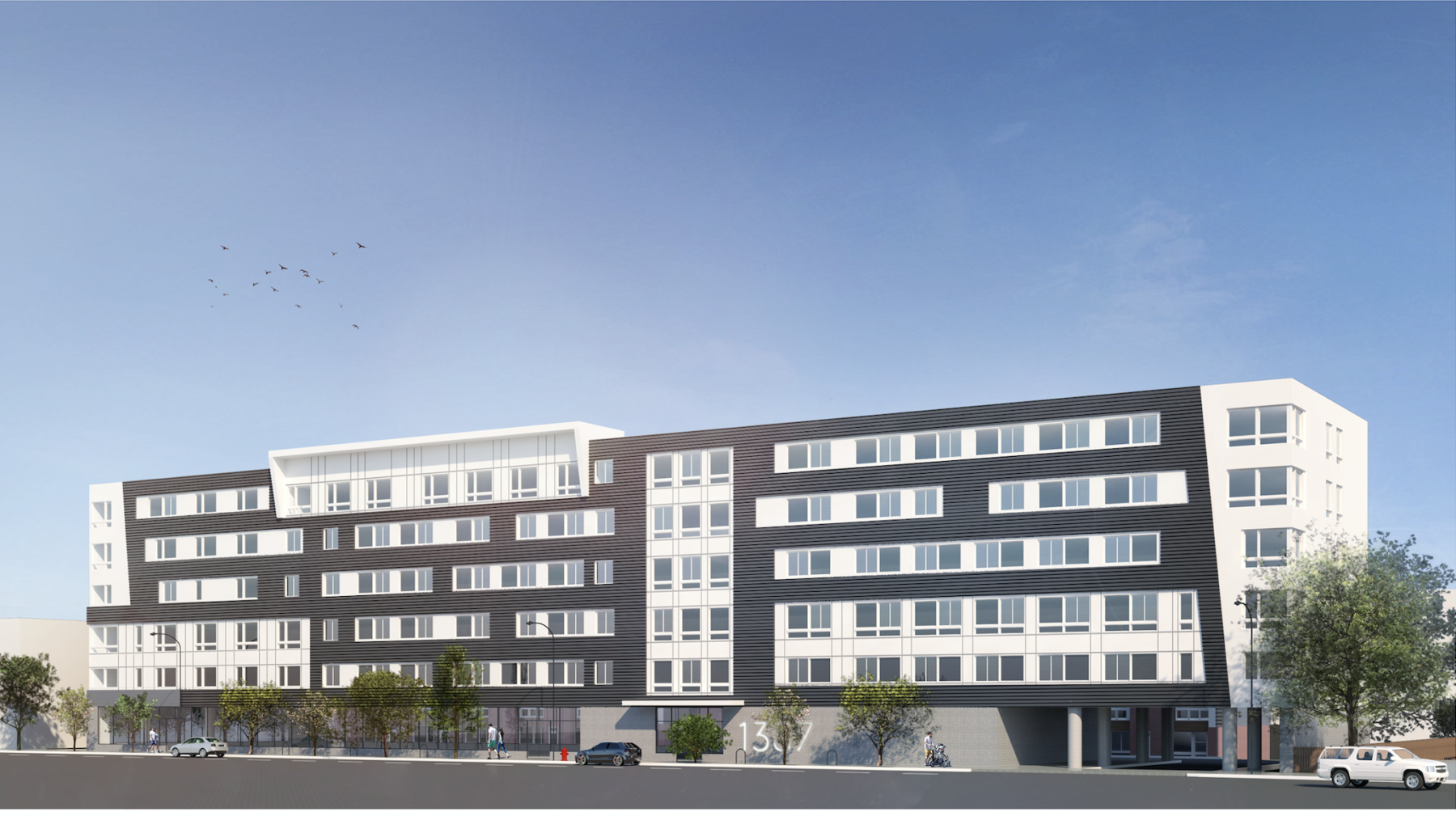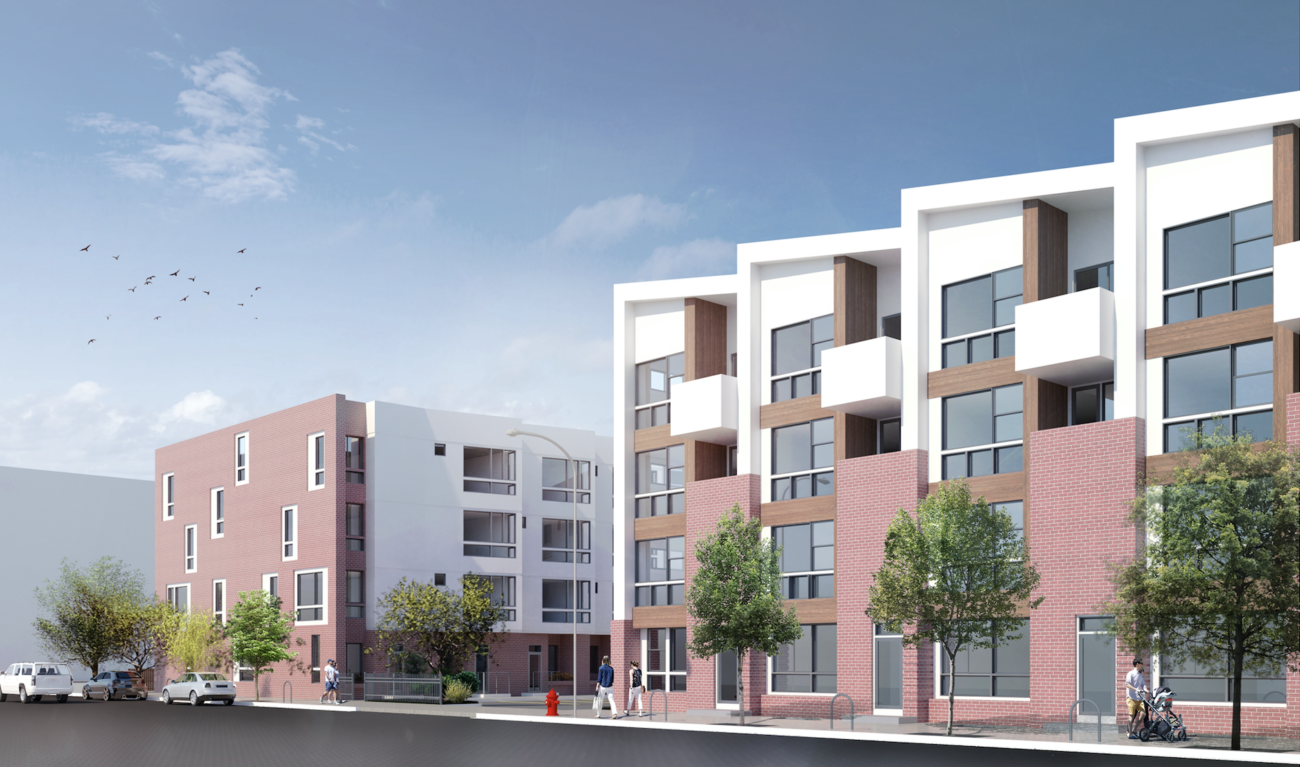
Streamline is developing a lot on the 1300 block of Germantown Avenue, between Thompson and Master streets.
Kimberly Paynter / WHYY

Streamline is developing a lot on the 1300 block of Germantown Avenue, between Thompson and Master streets.
Kimberly Paynter / WHYY

Kimberly Paynter / WHYY
Streamline is developing a lot on the 1300 block of Germantown Avenue, between Thompson and Master streets.
(Philadelphia) — East Kensington used to be an industrial hub, dominated by the kind of sprawling, dirty, and job-rich businesses that mostly left Philadelphia long ago.
Now the neighborhood is full of vast tracts of empty land, some of it scarred by toxic leftovers of yesterday’s industry. A few manufacturing businesses remain, like Emil’s, an organic deli meat processor.
And while most of the factories are gone, the old worker housing remains. Block upon block of red brick rowhouses still line Kensington’s streets. Increasingly, new construction does too, and lots of it.
“Because we have these big swaths of vacant land, we’ve seen these proposals for really dense projects,” said Eileen Divringi, board president of South Kensington Community Partners. “We have been a little bit overwhelmed by it, because we have meeting after meeting after meeting where we’re seeing proposals for 100-plus unit developments.”
One of the most recent projects reviewed by Divringi’s group is a 190-unit housing complex from Streamline Solutions, a Philadelphia-based firm known for townhomes and duplexes. Over two-thirds of the units will be in a mixed-use, multi-family building fronting on American Avenue.

An artist’s rendering shows a multifamily building proposed for 1307 Germantown Avenue in South Kensington. (Courtesy of Streamline)
The project is proposed for 1307-53 Germantown Avenue, the current home of Emil’s organic deli meat plant. But for much of the latter half of the 20th century, the land served as part of a scrapyard and auto parts shop. Environmental analysis of the site found traces of lead and other toxic contaminants, a common problem for Philadelphia builders.
The project has some hurdles to overcome before it can progress. Streamline is now working to lift a deed restriction blocking residential uses on the property. The company will also need a variance approved by the city’s Zoning Board of Adjustments.
“Over time, lead was shown to accumulate in the soil,” said Brian Donoghue, an environmental engineer hired by Streamline to analyze the site. “That’s why there’s a deed restriction on the property because those compounds exceeded the state-wide health standards.”
In recent years, some Philadelphia residents have become more aware of the dangers posed by lead and other toxic materials in the soil. In the summer, when soil is drier, there is a risk that disturbed earth can pose an air quality hazard and expose residents to airborne lead.
Russell Zerbo of the Clean Air Council studies real estate development in formerly industrial areas of Philadelphia. He believes that regulations haven’t caught up with the dangers that construction on such sites can pose. Lead doesn’t degrade over time and there’s nothing that can be put in the soil to eliminate it. The only answer is removal, which Streamline plans to do. But even this act of remediation can create hazards if workers aren’t careful with the dust.
“The best practice for controlling dust pollution is to wet down the affected area, which just sends the contaminated soil down the drain,” said Zerbo. “I think they should have to tent the entire site and the workers inside should be in full hazmat gear. This would be very expensive.”
Zerbo’s suggestion is far beyond what developers typically do. Instead, they usually hire contractors who specialize in removing toxic soil in ways that minimize the spread of dust.
Meanwhile, Donoghue’s firm, Comstock Environmental, will monitor the volume of soil removed, test the dirt for toxins and submit reports to the state’s Department of Environmental Protection, he said.
In a recent case on 2035 Lehigh Avenue, the state rejected the first report and forced the developer to remove even more soil.
Divringi says that some neighborhood residents are apprehensive about Streamline’s project. There are pre-existing anxieties around the site because of earlier remediation efforts at nearby 1304-54 North 2nd Street, which is currently under construction for residential use, and used to be part of the same scrapyard complex. The sheer scale of the project rubs some residents the wrong way too.

This artist’s rendering shows townhouses proposed for 1307 Germantown Avenue in South Kensington. (Courtesy of Streamline)
But she’s also heard concerns about Streamline’s capacity for handling a project that could potentially put neighborhood residents at risk. At South Kensington Community Partners meetings, they had been hearing about construction quality issues from homeowners who recently purchased the company’s townhomes in the neighborhood.
A recent PlanPhilly investigation found at least 20 cases where homeowners of Streamline units reported serious defects, including massive water infiltration and sewer lines backing up into homes.
“We’ve heard complaints about the quality of their construction,” said Divringi. “So it is concerning to know that a developer that is apparently cutting corners on things like foundations … will be taking on a site that is known to have contaminants.”
Streamline says that neighbors don’t need to worry about the company’s cleanup efforts. Lenders wouldn’t finance a project that didn’t undergo the necessary remediation and didn’t have the required regulatory check-offs, company leaders say. Investors get spooked if you don’t play by the rules.
“I would also say that a lot of what was recently reported dates back to projects that were from 2014 or 2015. Streamline then and the Streamline now are entirely different entities,” said Dave Larkin, the company’s general counsel. “That was really an upstart operation, with people doing whatever they could to survive and make money. I think we are now a bigger player with respect to staffing quality. We’re a different animal than what Streamline used to be.”
Larkin asserts that the vast majority of Streamline customers, both in the company’s younger days and now, are satisfied with their homes.
He said that the Germantown Avenue project will be a perfect example of Streamline’s evolution, from its younger days as an upstart townhouse developer to its current grander ambitions.
“There is an ability for us to differentiate ourselves from the people that may have been the way Streamline was five, six, seven years ago, that just didn’t have the capacity to do something like this,” said Larkin.
The project is slated to go before the city’s Civic Design Review in March and will seek relief from the Zoning Board of Adjustment in April. If they can secure a victory there, environmental remediation efforts could begin as soon as this summer — when the risk of dry soil is especially acute.
WHYY is the leading public media station serving the Philadelphia region, including Delaware, South Jersey and Pennsylvania. This story originally appeared on WHYY.org.

Get insights into WITF’s newsroom and an invitation to join in the pursuit of trustworthy journalism.
The days of journalism’s one-way street of simply producing stories for the public have long been over. Now, it’s time to find better ways to interact with you and ensure we meet your high standards of what a credible media organization should be.